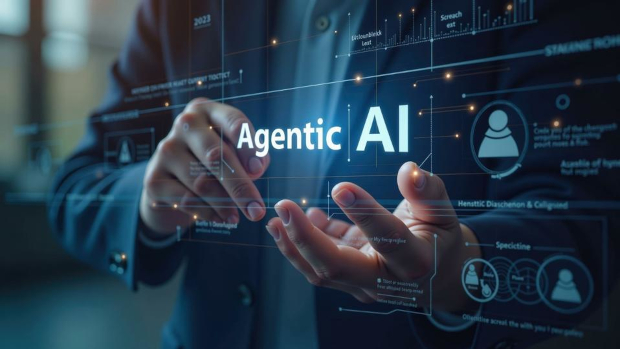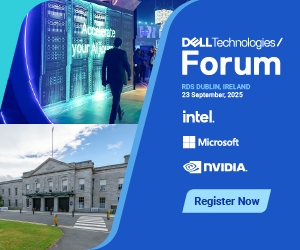
Understanding agentic AI: The new autonomous frontier
In association with Dell Technologies Ireland
Agentic AI represents the next frontier in artificial intelligence innovation where autonomous agents work together as a team. Although agentic AI is in its early stages, it has the potential to help enterprises achieve remarkable gains in productivity, efficiency, and scalability by eliminating inefficiencies and seamlessly scaling an organisation’s collective skills. With AI agents, enterprises can gain a competitive advantage by delivering insights faster and making strategic decisions more effectively.
AI lessens the burden of using complex tools and dissolves siloes by augmenting human capabilities. Now, employees can contribute more meaningfully to specialised tasks with the assistance of AI. Teams working with AI are three times more likely to be in the top decile of performance than individuals working with AI or teams working without AI.
Defining agentic AI
An AI agent is a software system that uses artificial intelligence to autonomously make decisions and take actions to achieve a set of objectives. AI agents have the power to reason, learn and adapt based on their perception of the work environment. As a result, they can be given a goal and carry out complex tasks to reach that goal, with minimal or potentially no human interaction.
AI agents surpass automation by adapting and learning within complex workflows. To tap into the potential of agentic AI, it’s important to understand the difference between automation and autonomy. Automation is a predefined set of actions that are performed by a piece of technology, whereas autonomy is an intent that is given to technology and the technology then determines and performs the task. Autonomy happens when the human ceases to be the ‘doer’ of the work or ceases to define the workflow.
Take supply chain management as an example. An automated robot can be designed to pick, pack and ship goods in a productive manner that reduces errors, achieving faster order completion and customer satisfaction. An autonomous agent, or AI agent, can optimise supply chain management by predicting demand, managing inventory levels, and coordinating with suppliers to ensure timely restocking. It could identify potential disruptions and suggest solutions to maintain the smooth flow of goods.
Understanding their unique roles of generative AI vs. agentic AI
AI agents are different from generative AI (GenAI) chatbots and assistants. GenAI chatbots and assistants help us unlock the power of data, so we can more effectively interact with and act on it. In contrast, AI agents interact with the data and act on our behalf based on our desired goals and without our intervention.
An AI agent is typically composed of a core (ie a persona, goals, and a list of available tools); a memory; tools to perceive and interact with its environment; and some form of reasoning function that is likely based on an AI model (eg a large language model). The capabilities of these building blocks determine the AI agent’s reasoning ability and influence its degree of autonomy.
Balancing autonomy and oversight for effective AI integration
Humans are critical to agentic AI because they provide intentionality for AI agents. Despite the autonomous nature of AI agents, there is still a human involved in defining what success looks like to the AI agents. The biggest shift from GenAI chatbots and assistants to AI agents is that humans are in the loop with GenAI tools. This means humans are deeply involved in defining how work is going to be done.
With the current slate of AI agents, humans are on the loop. This means that you define the outcome and the intent, but you have delegated the AI agent to figure out how to perform the task. AI agents will become one of the most impactful tools that accelerate enterprise efficiency by taking on complex tasks while continuously improving themselves through learning and adaptation.
These questions of oversight, governance, and the evolving relationship between humans and AI are not just theoretical, they are at the heart of the conversations we’ll be having at the Dell Technologies Forum in Dublin on 23 September. From exploring how Irish businesses can build trustworthy, autonomous AI systems to examining next-generation AI infrastructure, to understanding how GenAI and agentic AI work in tandem. This year’s Forum will bring these concepts to life with real-world examples and the insights of Dell experts.
Practical applications of agentic AI
AI agents are autonomous and function-serving, which means they are capable of interfacing with other systems and taking actions in those systems. However, the first generation of AI agents are captive within a particular product, system, or vendor. As the technology advances and interoperability standards are defined, it can be leveraged across software programmes and across business units from sales to finance, marketing to HR, and in the supply chain.
To prepare for agentic AI, enterprises should look at their technology infrastructure foundation and ensure it is equipped to power and scale AI agents. Identify priority use cases to plug AI agents and start thinking about how to integrate them into your workflows across enterprise software systems and other IT operations.
At this year’s Forum, speakers will provide practical advice for decision makers that can help their organisation overcome infrastructure challenges, unlock productivity, and prepare their workforce for new roles in an AI-driven environment. Sessions will dive into how IT leaders can balance innovation with security, compliance, and ethical considerations while scaling AI initiatives.
The potential impact of agentic AI
Before we know it, AI agents will become the new application programming interface (API) of business, enhancing the way enterprises operate regardless of industry. The real value of AI agents is not when they are in isolation, but rather when they start to work together. This could be an ensemble of agents working inside your company (eg different AI agents with different frameworks), or the next evolution: when your AI agents can interact with someone else’s AI agents. With interoperability standards soon to be defined, it won’t be hard to imagine your AI agents interworking with the AI agents of vendors, partners, and customers. The possibilities are endless.
I’m excited for what the future holds for agentic AI and how it will propel enterprises into the future. Dell Technologies Forum will be an important forum for these discussions, bringing together Ireland’s business community to explore agentic AI and its impact on business transformation, leadership, and competitiveness in the AI era.
Join us at the Royal Dublin Society in Dublin on 23 September for the 2025 Dell Technologies Forum, run in collaboration with Nvidia, Intel, and Microsoft. For more information and to register for this event, click here
Neil Bowden is director of data analytics & AI at Dell Technologies Ireland






Subscribers 0
Fans 0
Followers 0
Followers